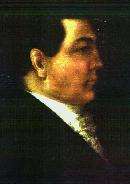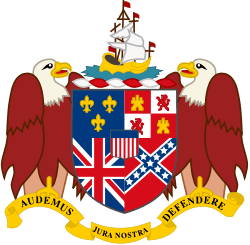William Wyatt Bibb
| William Wyatt Bibb | |
|---|---|
 | |
| 1st Governor of Alabama | |
|
In office December 14, 1819 – July 10, 1820 Territory: March 6, 1817– December 14, 1819 | |
| Preceded by | Position established |
| Succeeded by | Thomas Bibb |
| United States Senator from Georgia | |
|
In office November 6, 1813 – November 9, 1816 | |
| Preceded by | William B. Bulloch |
| Succeeded by | George Troup |
| Member of the U.S. House of Representatives from Georgia's at-large district | |
|
In office January 26, 1807 – November 6, 1813 | |
| Preceded by | Thomas Spalding |
| Succeeded by | Alfred Cuthbert |
| Member of the Georgia House of Representatives | |
|
In office 1803-1805 | |
| Personal details | |
| Born |
October 2, 1781 Amelia County, Virginia |
| Died |
July 10, 1820 (aged 38) Elmore County, Alabama |
| Political party | Democratic-Republican |
| Spouse(s) | Mary Freeman |
| Alma mater |
College of William & Mary; University of Pennsylvania |
| Signature |
|
William Wyatt Bibb (October 2, 1781 – July 10, 1820) was a United States Senator from Georgia and the first Governor of the U.S. state of Alabama. Bibb County, Alabama, and Bibb County, Georgia, are named for him.
He was a member of the Democratic-Republican political party. Bibb served as governor of the Alabama Territory from August 1817 to December 1819, and as the first elected governor of the state of Alabama from December 1819 to his death on July 10, 1820.
Early life
Bibb was born in Amelia County, Virginia, and later moved with his family to Georgia. After having attended the College of William and Mary and the University of Pennsylvania School of Medicine, he was awarded an M.D. degree in 1801. He returned to Georgia and began practicing medicine in Petersburg.[1] In 1803, he married Mary Freeman.
Politics in Georgia
Bibb's first office was as a member of the Georgia state House of Representatives from 1803 to 1805. He was elected as a Democratic-Republican to the Ninth United States Congress to fill a vacancy caused by the resignation of Thomas Spalding, and was reelected four times, serving until November 6, 1813. He was then elected by the Georgia General Assembly (state legislature), to the United States Senate to fill a vacancy created by the resignation of the nationally known and presidential candidate William H. Crawford and served until November 9, 1816.
Governor of Alabama
Fifth President James Monroe, (1758–1831, served 1817–1825), appointed Bibb as the first governor of the newly formed Alabama Territory (out of the larger previous Mississippi Territory in 1817. Alabama became the 22nd state on December 14, 1819. Bibb was elected governor, defeating Marmaduke Williams. Bibb received 8,342 votes, while Williams received 7,140 votes.[2]
Bibb's primary duties were establishing the state government.[3] Huntsville was designated the first state capital. The capital was later moved to the town of Cahawba in 1820, again to Tuscaloosa in 1826, and finally to the central city of Montgomery in 1846, where a State Capitol building was later begun (later the site of the historic inauguration in 1861 of Jefferson Davis of Mississippi as the first provisional and only President of the Confederate States of America after the first seven of thirteen southern states seceded, with Montgomery as the temporary Southern National Capital. Later several famous Civil Rights Movement marches and protests were held here in the 1950s and 60's).
During Bibb's tenure, the Alabama state militia, (now Georgia National Guard) and the beginnings of the state judicial system with the organization and appointments to the Supreme Court of Alabama were accomplished.
Henry Hitchcock was elected the first Attorney General of Alabama, and Thomas A. Rogers was elected and John W. Walker were chosen as the first U.S. Senators.
Death
In 1820, Bibb suffered a fall from a horse. He died from internal injuries on July 10, 1820. His brother, Thomas Bibb, was president of the state senate at the time and completed the rest of his term. Bibb is buried in Elmore County, Alabama. As first governor his likeness appears on the Alabama centennial half dollar, which was minted in 1921.
References
- ↑ "William Wyatt Bibb". Alabama Department ofArchives & History. Retrieved July 13, 2012.
- ↑ Dupre, Daniel S.; Webb, Samuel L.; Armbrester, Margaret E. (2014). Alabama Governors : A Political History of the State. Tuscaloosa: University of Alabama Press. p. 16. ISBN 9780817318437. Retrieved 24 October 2016.
- ↑ Abernethy, Thomas Perkins (1990). The Formative Period in Alabama, 1815-1828. Tuscaloosa: University of Alabama Press. p. 5. ISBN 9780817352134. Retrieved 24 October 2016.
- United States Congress. "William Wyatt Bibb (id: B000434)". Biographical Directory of the United States Congress.
- Political Graveyard
External links
| United States House of Representatives | ||
|---|---|---|
| Preceded by Thomas Spalding |
Member of the U.S. House of Representatives from Georgia's at-large congressional district January 26, 1807 – November 6, 1813 |
Succeeded by Alfred Cuthbert |
| United States Senate | ||
| Preceded by William B. Bulloch |
U.S. Senator (Class 2) from Georgia November 6, 1813 – November 9, 1816 Served alongside: Charles Tait |
Succeeded by George Troup |
| Political offices | ||
| Preceded by (none) |
Territorial Governor of Alabama 1817–1819 |
Succeeded by Governor of Alabama |
| Preceded by Position established |
Governor of Alabama 1819–1820 |
Succeeded by Thomas Bibb |

